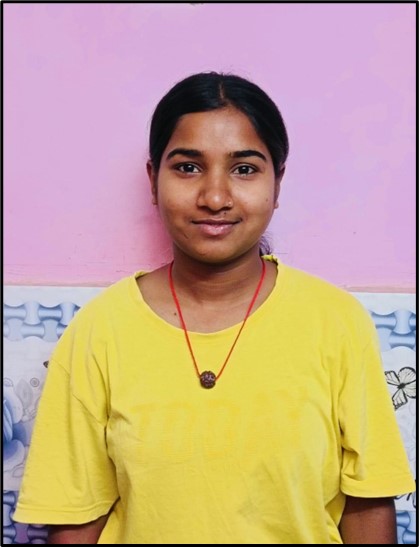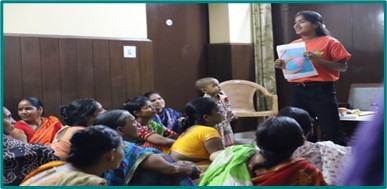 It's a journey from a hesitant girl to an inspiration for others in my community," says Jyoti Kumari, a 21-year-old student currently pursuing her graduation at a college affiliated with Delhi University. Born and raised in Gopalpur, Mukherjee Nagar, Delhi, and comes from a low economic background, her father is a rickshaw puller, and her mother is a domestic worker, makes sure that all their children get quality education, but she and her family has a different ideology altogether.
It's a journey from a hesitant girl to an inspiration for others in my community," says Jyoti Kumari, a 21-year-old student currently pursuing her graduation at a college affiliated with Delhi University. Born and raised in Gopalpur, Mukherjee Nagar, Delhi, and comes from a low economic background, her father is a rickshaw puller, and her mother is a domestic worker, makes sure that all their children get quality education, but she and her family has a different ideology altogether.
Introduced to the KBC program by Sister Bibyana, a field coordinator at the Martha Farrell Foundation and advocating for women's rights, Jyoti found herself engaged in the program's discussions. She gained a lot of confidence after being part of the KBC program for a year. Through these sessions, Jyoti gained a deeper understanding of the gender biases prevalent in society, despite constitutional guarantees of equality says Jyoti. She learned about discrimination faced by both girls and boys based on toys, colours, and clothing in society.
Jyoti expressed that one particularly impactful session was the leadership workshop held at MFF’s office, where adolescents from different communities and various backgrounds came together to discuss and understand their role as leaders in tackling community issues. This experience exposed Jyoti to different perspectives and inspired her to take action in her community."After attending a leadership workshop, I applied the learnings in my community like in one of the sessions, where we mapped our community based on safe and unsafe spaces and engaged with the locals. I recall instances where my group members hesitated to speak, and I stepped forward to take the initiative in leading my team. It felt great to take on a leadership role within my community" says Jyoti.
Violence manifests in various forms, such as limiting girls to household chores or restricting their freedom. "Earlier, I experienced discrimination within my family. I recall my first job at a call center where I often worked late at night. One evening, I arrived home at 11:00 pm, and upon learning this, my father scolded me severely, insisting that I quit my job immediately. I felt deeply hurt that day, unable to find the courage to speak up, so I resigned from my job. However, since becoming involved with the KBC program, I have gained confidence. Today, I can openly express myself in front of my father, and he understands me better, supporting my decisions and allowing me to pursue my aspirations." says Jyoti. Initially met with resistance, her newfound confidence and assertiveness gradually won her parents' understanding and support. Today, she can express herself freely in front of her parents and has become a role model for her sister, who also joined the program.
Jyoti says, that in the past, discussions about menstruation in school often resulted in segregating boys and girls, with boys being asked to leave the room while conversations were exclusively held with girls. These practices perpetuated gender biases because everyone should have awareness about menstruation; segregating boys during these discussions excluded them from understanding the issue properly. I believe it's essential to change this approach. Menstruation is a natural process, and everyone should be educated about it without any discrimination. This change in mindset can contribute to a more inclusive and informed society. Reflecting on her experiences, Jyoti recognizes the importance of challenging societal norms and standing up against gender biases. She is determined to be part of the KBC programme and hopes to inspire others to join her in creating a more inclusive and equitable society.
IN SHORT
 “In the past, discussions about menstruation in school often resulted in segregating boys and girls, with boys being asked to leave the room while conversations were exclusively held with girls. These practices perpetuated gender biases because everyone should have awareness about menstruation; segregating boys during these discussions excluded them from understanding female bodies, which is also discrimination and also strongly contributing to the violence which happens in communities, schools, everywhere.
“In the past, discussions about menstruation in school often resulted in segregating boys and girls, with boys being asked to leave the room while conversations were exclusively held with girls. These practices perpetuated gender biases because everyone should have awareness about menstruation; segregating boys during these discussions excluded them from understanding female bodies, which is also discrimination and also strongly contributing to the violence which happens in communities, schools, everywhere.
I believe it's essential to change this approach. Menstruation is a natural process, and everyone should be educated about it without any discrimination. This change in mindset can contribute to a more inclusive and informed society.”
-Jyoti Kumari, 21 year old, Mukherjee Nagar Community